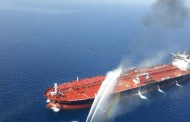(Reuters) – Iraqi Kurdish forces said they had recaptured the country’s biggest dam from Islamic State militants on Monday, although an employee at the site said jihadist fighters still controlled key points on the vulnerable structure.
Hoshiyar Zebari – a Kurd who has been foreign minister in the outgoing Iraqi government – also said officials from his community would join talks on forming a new, inclusive administration considered vital for combating the Sunni Muslim militants who have overrun much of the country.
The Islamists’ seizure of the Mosul hydroelectric dam in northern Iraq marked a stunning setback for Baghdad’s Shi’ite-led authorities and raised fears the militants could cut power and water supplies, or even blow the shaky structure, causing huge loss of life and damage down the Tigris river valley.
Iraqi officials hailed what they said was a strategic victory in regaining control of the dam, and announced that the next objective would be to win back Mosul itself, the biggest city in northern Iraq which lies 40 km (25 miles) downstream.
However, any lingering threat to the dam from IS fighters would like a gun to the city’s head, holding it hostage.
Zebari said forces from the Kurds’ autonomous region had captured the dam – blighted by structural problems since it was built by West German engineers for Saddam Hussein in the 1980s – with help from U.S. air strikes nearby in a difficult operation.
“Taking the dam took longer than expected because the Islamic State had planted land mines,” he told Reuters.
Baghdad officials expressed their determination to turn the tide against the Islamic State, whose campaign to create a regional caliphate has threatened to tear Iraq apart.
“The new tactic of launching a quick attack shrouded by secrecy proved successful and we are determined to keep following the new assault tactics with help of intelligence provided by Americans,” Sabah Nouri, a spokesman for Iraq’s counter-terrorism unit, told Reuters.
“The next stop will be Mosul.”
An employee at the dam, however, contested the government’s version of events. “Islamic State fighters are still in full control over the dam’s facilities and most of them are taking shelter near the sensitive places of the dam to avoid air strikes,” the employee told Reuters.
The employee gave no further details. However, engineers have repeatedly expressed concern about the state of the 3.5 km-wide (2.2 mile) dam since Saddam was overthrown in 2003.
A 2007 U.S. Army Corps of Engineers report obtained by the Washington Post said the dam, which blocks the Tigris and holds 12 billion cubic meters of water, could flood two cities killing tens of thousands of people if were destroyed or collapsed.
A wall of water could surge as far as Baghdad, 400 km away.
At the time, Iraqi officials described these warnings as alarmist and said measures were being taken to shore up the dam that has been weakened by cavities caused by soil being washed out. These holes need to be constantly refilled but it is unclear whether this work has continued under the militants.
KURDS WILLING TO TALK
Zebari said Kurdish officials would take part in negotiations on forming a new government, signaling the possibility of improved ties with the central administration.
Prime Minister Nuri al-Maliki stepped down last week after criticism that his policies, by favoring Shi’ites, had encouraged some members of the Sunni minority to join the Islamic State insurgency.
Haider al-Abadi, a fellow Shi’ite with a less confrontational reputation, has been appointed prime minister-designate to try to form a government including leaders of Iraq’s main minorities. The aim is to form a united front to take on the Islamic State, which is accused of brutality and extreme violence.
Zebari said a final decision on whether the ethnic Kurds would end their suspension of participation in the government would be made later. Maliki had been locked in disputes with the Kurds over allocation of budget funds and revenue from oil produced in their autonomous region.
Last week, tribal leaders and clerics from Iraq’s Sunni heartland also offered conditional backing for a new government. One of the most influential leaders said he was willing to work with Abadi provided a new administration respected the rights of the Sunnis, who dominated Iraq under Saddam.
MISSION CREEP
The United States has helped the Kurds with a series of air strikes on Islamic State fighters – the first since it pulled out of the country in 2011 – saying it was preventing genocide in a conflict that has displaced hundreds of thousands.
A number of European Union countries have also armed the Kurds or said they would do so. However, intervention in Iraq remains a sensitive political issue after the Western invasion and a subsequent occupation frequently marked by bloodshed aroused strong public opposition.
British Prime Minister David Cameron played down the possibility of fresh “mission creep” in Iraq.
“Britain is not going to get involved in another war in Iraq. We’re not going to be putting boots on the ground. We’re not going to be sending in the British army,” he told the BBC.
Britain has so far carried out aid drops and surveillance and transported military supplies to Kurdish regional forces allied with the Baghdad central government.
But Defence Minister Michael Fallon said earlier that the Britain’s role in Iraq had moved beyond just providing aid and expanded operations could last for months.
Fallon told The Times newspaper that RAF Tornado aircraft and a spy plane were flying further into Iraq, beyond the focus area of the humanitarian crisis in the Kurdistan region, to gather information on the forces of Islamic State.
“This is not simply a humanitarian mission,” Fallon said.
Peshmerga Forces Completely Control Mosul Dam
 18.08.2014
18.08.2014
Shwan Barzinji and Hoshmand Sadiq
BasNews, Erbil
Kurdish Peshmerga forces, aided by Iraqi and US airstrikes, have retaken complete control of Mosul dam in Northern Iraq, a key strategic position in the continuing fight against Islamic State.
A source from 3rd Battalion of Peshmerga forces fighting near Mosul dam told BasNews that after starting attacks on Islamic State (IS) Militants near the dam, by late Sunday night they had taken complete control.
“In clashes on Sunday, the Peshmerga attacked from the ground whilst US planes shelled IS positions. Late Sunday night we were able to control the dam,” added the Peshmerga source speaking on condition of anonymity.
“The progress of the Peshmerga forces near the dam is slow, because we suspect IS militants have planted bombs around and on the dam. We are now checking the area for possible devices,” he added.
The Peshmerga commander also revealed that as a result of bombs exploding when the Peshmerga were entering freed villages two were killed and five more injured.
He also added that tens of IS militants were killed during the Sunday attacks near the dam and others were captured and are currently held by the Kurdish forces.
Mosul dam which is one of the biggest and most important dams in the country. There were fears IS might bomb the dam, flooding up to half of Iraq.
The Dam came under IS control on August 10th, when Peshmerga forces withdrew.
Meanwhile, a source from Mosul has told BasNews that a large number of IS wounded have been rushed to hospital in the city.
http://basnews.com
υ.γ.
Πεσμεργκά σημαίνει «εκείνοι που αντιμετωπίζουν το θάνατο»
Πρόκειται για τους Κούρδους μαχητές του Ιρακινού Κουρδιστάν, της ημιαυτόνομης περιοχής στο Βόρειο Ιράκ, η οποία έχει αναγνωριστεί τόσο από την ιρακινή κυβέρνηση, όσο και από τα Ηνωμένα Έθνη















